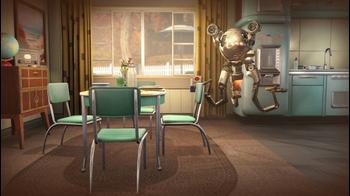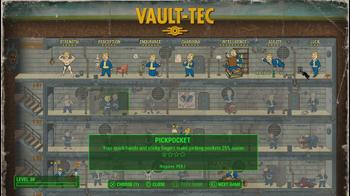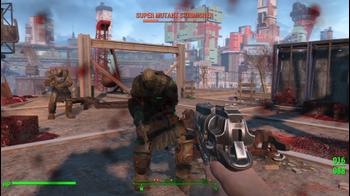Fallout 4 Review
Fallout 4 has a lot to live up to. Its predecessor took a cult classic series and turned it into a beloved mainstream RPG property, while its nearest relative Skyrim sold over 20 million copies. It’s also Bethesda Game Sudios’ first chance to show what they can do on the current console generation.
After almost sixty hours with the game on my main file, it's something of a relief to report that it carries that torch well. While there are of course caveats, Fallout 4 feels like a solid evolution on the formula Bethesda has been iterating on since 2002's Morrowind. It works, and not once during my time so far have I felt like I've wanted to stop - I've had a feverish addiction that I honestly haven't experienced with a Bethesda title since Oblivion.
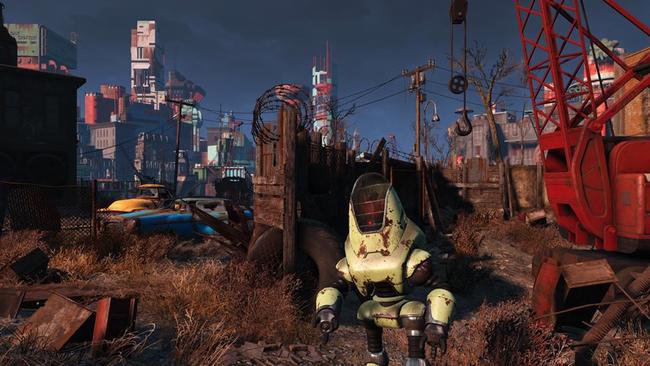
The narrative setup in Fallout 4 is remarkably swift. This review is going to remain spoiler-free, but it's fair to say that if you've seen Bethesda's E3 presentation of the title, you've seen a lot of the set up. You're one half of a married couple with a young son before the bombs fall, and the game opens with you enjoying just another day in the utopic world of Fallout's alternate-universe USA.
Eventually you pick one of the pair - I chose to play the woman - and, inevitably the bombs fall. Paradise is shattered. You end up inside one of the Vaults designed to preserve humanity from the nuclear holocaust, and are cryogenically frozen for hundreds of years. Events occur inside the vault in a brisk fashion, some of them shocking, and when you wake up and exit the vault into the nuclear wasteland, you are alone.
That's the set up, and really all you really need to know. There is of course a story and motivation for your character, and in some senses it is an inversion of the plot of Fallout 3 - but what is smartest narratively is the choice to have the player character hail from before the war.
Where in Fallout 3 you embody a character who hasn't known the Wasteland but at the same time has only ever known a post-war world, in Fallout 4 your character remembers everything as it was, and in showing a brief snippet of pre-war life before ripping it away Bethesda achieves a level of immediate character and world development they haven't often managed previously. Very early on you return to your ruined home, and there's strength to that moment that's uncommon in games this open.
These titles have always been about exploration of a world and building your own stories rather than following a strict narrative path, but much about Fallout 4's narrative feels better constructed. There's enough wriggle room in the plotine that it doesn't feel entirely nonsensical to meander off and do something random or just explore for a few hours, and the story presentation has improved a touch, which certainly helps. The actual writing never quite manages to reach the heights Obsidian managed with New Vegas, but it far outstrips what was on offer in Fallout 3.
Much as it did in Skyrim, Bethesda's semi-new Creation Engine still bears the marks of its underlying use of Gamebryo, and you can expect the same puzzling 'what the hell' moments seen there from time to time. At one point, a character delivered a speech with their back turned, the camera focused on the back of their head in medium close-up - only for them to turn around once they'd finished their pivotal line.
None of this ruins the experience, and it has to be said that Fallout 4 makes a better run at telling a compelling story than ever before - it just doesn't quite reach what it's aiming for. There are snippets of narrative brilliance littered throughout the Commonwealth Wasteland, but they're often scattered between a sea of basic kill and fetch quests. The core story thread is much better with some lovely moments that shine past the confines of an engine that is the antithesis of cinematic.
The Bioware influence is obvious, from replacing the list-like dialogue selection with a button-based conversation wheel system right through to the way companion characters are used, including the ability to flirt with and eventually enter into a relationship with some of the men and women you party up with throughout the game.
The openness of a title like Fallout means that none of these characters quite push to the same depth as elsewhere, but what's there is solid.
Characters bond with you more through simply being with you and seeing you do things; investigative journalist and troublemaker Piper always got a kick out of seeing me pick locks, and would often be happiest if I could resolve a situation without violence - and she'd react to that. Brotherhood of Steel member Danse meanwhile has a happy trigger finger and seemed to bond best through fighting. The relationships are furthered by partner characters stopping you for a chat once your invisible friendship level reaches a certain point - and this will happen a few times before you can either become the best of friends or lovers, which grants a perk. It's simplistic, but it works for a game where much of your focus isn't on those characters, but on exploring the vast world that's on offer.
Speaking of perks, it's worth noting that Fallout 4's character progression has been streamlined a touch but feels to have lost little through that adjustment. Everything is now based around the SPECIAL system, which forms the base of the perk tree. Each of those letters stands for something (S is Strength, P is Perception, etc.) and it's into those seven categories players plough their first skill points at character generation.
From there you can spend points in those categories up to eleven points in each, with points spent in each unlocking the ability to later spend on a new perk beneath it within that category. Spending three points in strength allows players to then put up to four points into 'Armorer', for instance, which gives access to better armor modifications.
It's a vastly simple system, but with seven base categories and ten multilevel perks beneath them, it's possible to end up with vastly different character builds. I went for a gunslinger with low strength who survived by talking her way out of things or by using her brilliant skill in crafting and science to have the best possible equipment, but I feel like I could easily have a vastly different experience if I leveled a new character in a different way.
Beyond the base perks, additional ones are afforded by finding books in the environment and through strong relationships with companion characters. It all just works, and I'm pleased to say that in this character customization the backbone of what made Skyrim and its kin great remains firmly intact.
Another vital RPG pillar for this series in particular is equipment customization. Building and forging your own gear is something that thematically makes a lot of sense in Fallout's post-apocalyptic world, and I think it's at a series best in Fallout 4. All of that revolves around one smart little decision - making all the loot in the world have a purpose. In previous games there was a lot around to pick up, but a lot of it didn't exist for any reason other than to be sold. That's gone now - and it really satisfies the kleptomaniac in me and gives a sense of accomplishment to returning home with a lot of gear in tow.
A hairbrush, for instance, can be used as a source of plastic. Empty bottles provide glass. More complex items are better still - a pre-war Camera is heavier and thus takes up more inventory space, but contains several springs and gears, vital for crafting. Junk collected can be stashed at a workbench, allowing you to then access it when using that bench. Collecting vast hauls of gear became a minor addiction for me, and I'd sometimes venture out without a mission in mind to just pick up what would be otherwise useless items for building out weapons.
Weapons can be adjusted part-for-part - the barrel, the stock, the trigger and so on - and each part has a number of different options available which adjusts both appearance and utility. On a broader level there are a number of basic categories of weapon, so you have the choice between a cheap and heavily customizable pipe pistol or a more familiar 10mm that can be customized less and so on. I ended up carrying around seven or eight different weapons at a time, each suited for a slightly different purpose, and each customized further for that purpose.
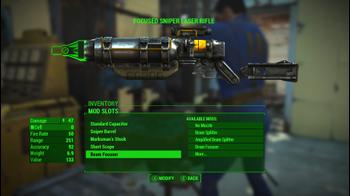
Armor is a little less customizable, but still has a few hooks on each item. 'Legendary' enemies drop special loot with an additional perk attached, so very often the gear I used was pilfered from such corpses and then customized to better fit my needs.
Foraging junk has a second purpose - building settlements. This is a key new feature and essentially injects a little bit of Minecraft into the Wasteland. Players can use materials like wood, cloth, steel, plastic and so on to construct and decorate fully custom shelters and defenses at settlements. As they build, settlers will hear about these locations and visit or join them.
It's up to you to ensure each settlement remains able to defend, feed, and water itself as it grows. Doing so involves entering a special 'build mode' before spending materials to drop in pre-fab buildings, create them manually by snapping pieces together, or drop down items from defensive walls and guns through to luxury items that increase settler happiness like sofas, carpets and radios. The controls here leave a little to be desired, with first person mode forced and no way to zoom out and check your work from afar - but I got used to the twitchy nature of them over time.
There are over ten different settlement locations of varying shapes and sizes, and I had a great deal of fun toying with them and watching them grow. Wanting to build more complex things such as power and lighting requires more resources, which in turn drives you out into the wasteland to search for junk to reverse engineer into what you need. In this sense this entirely optional activity drove me to roleplay Fallout's desperate post-apocalyptic setting more than ever before - and I loved that in spite of the fiddly controls.
When time comes to use your weapons, Fallout 4 performs better than its predecessors. There’s no parity with a full shooter, but the combat here is better than ever; I felt way more comfortable shooting outside of VATS. Third person also feels smoother than before, a mode that has slowly improved with each game, while first person blasting is better still.
The content is good then; and with that said it's time to address the elephant in the room - performance and visuals. Bethesda and their Creative Engine have come in for a lot of criticism over the years, and despite a complete media black-out as launch approached the same old rumblings began to rise online - that the game was buggy, it had frame rate problems, or that it had rough texture work. I see no better way to address this than to tackle each based on my lengthy experience with the PS4 version.
On bugs: they're there, but this has still proved to be the least buggy experience I've had in a Bethesda sandbox. In my time with the game I had one hard lock and one bugged out sidequest, plus a number of minor errors that proved to be nothing more than a break in immersion.
On the frame rate: The vast majority of the time the game runs at a solid rate, but on two or three occasions it dropped frames spectacularly, dropping to something like 10 frames per second for several seconds before shooting back up to the regular rate. In every instance this happened alongside a huge explosion involving a lot of objects and enemies.
Smaller, less egregious drops were also occasionally experienced at busy times, but this was for the most part infrequent. The lion's share of gameplay passed without such incidents, and it was never frequent enough to be a major inconvenience. In general I found its performance to be a non-issue, even as load times slightly increased as the save file bloated in size later on. I do feel compelled to note, however, that from conversations with other media it does appear your own mileage may vary somewhat in this area.
On textures: Yes, Fallout 4 has some seriously dodgy texture work. It's a game that I'd describe as best when scrutinized with the big picture in mind; when you consider the scope of the world, the building you can do, and the game's robust open-world feature set, it's impressive that from afar it looks as good as it does. From a distance, say a rooftop or a highway, its world looks lush; it's a more vibrant and colorful world than Fallout 3 and looks better for it, but up close and personal some of the textures look awful. It's strange in that some of the textures are positively lovely, but then detailed brick work will be sat right next to a low resolution pile of garbage that looks, well, like garbage.
Fallout 4 is always encouraging you to keep moving through its world to see more of it, such is its size, so it doesn't actually dwell on these sights. More enclosed spaces like interiors always seem to have more attention to detail, but that isn’t a good excuse for how rough it gets elsewhere, and it would be wrong to not note that.
Small bugs and bits of classic Bethesda jankiness around story presentation or even combat I can cope with; AIs doing weird things, the odd bit of clipping - but the quality of the texture work in parts of the Wasteland stands out as beyond that; as the one true dark spot in an otherwise excellent game.
That's the ultimate point, though - this is still an excellent game. It brushes flaws that could cripple any other game off as if they were nothing, such is the craftsmanship on display. Fallout 4 strides right through most of its shortcomings with confidence, presenting a robust package with some truly engaging new mechanics and adjustments, the best of which is the settlement management, a little game all of its own.
The biggest compliment I can give is that after so many hours I'm going to wrap up this review and head right on back to the Wasteland - it's just unfortunate that what could have been an absolutely perfect experience is bought down a peg or two by performance and visual problems. With all that said this still comes heartily recommended, and is a strong contender for the best RPG of the year.
